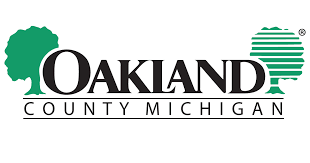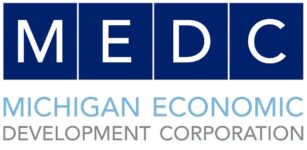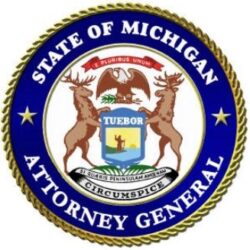
Whitmer approves $28 million in outdoor recreation development
|
|||||
 |
|||||
– DNR News – |
|||||
|

|
|||||
 |
|||||
– DNR News – |
|||||
|
|
||||||||
DNR Get Involved – August 2020
|
||||||||
|
||||||||
| DNR COVID-19 RESPONSE: For details on affected DNR facilities and services, visit this webpage. Follow state actions and guidelines at Michigan.gov/Coronavirus. |

Pontiac, Michigan – Five more Oakland County manufacturers will share $147,000 in “Saving Business, Saving Lives” grants to make personal protective equipment such as masks and face shields used in the fight against the coronavirus.
Oakland County Executive David Coulter announced the grants today, which come from a $1 million fund he proposed and was approved by the county Board of Commissioners to incentivize Oakland County manufacturers who can shift production to include personal protective equipment such as masks, gowns, face shields or medical device components. More than $660,000 has been shared by 18 companies.
“Oakland County manufacturers continue to step forward to help in this fight against the coronavirus,” Coulter said. “Personal protective equipment remains critical for our recovery. Health care workers, first responders and others have an ongoing need for this important protective equipment. I applaud these companies for their willingness to help.”
The “Savings Business, Saving Lives” grant is part of larger job stabilization effort by the county, which has committed more than $100 million to small businesses, communities and residents who have been devastated by the COVID-19 pandemic.
The companies receiving grants are:
Charm View Beauty and Sew, Southfield
Owner Bridget Grier
Traditionally a beauty shop and sewing instruction business providing classes for youth and adults in how to sew. Pivoted to produce face masks with N95 filters and cloth gloves.
AC Steel Rule Dies, Madison Heights
Owner Randy Genord
Custom design, manufacturing and assembly of steel rule dies for automotive suppliers, die cutters and printers. Pivoted to produce tooling and fixtures for companies that produces N95 masks, face shields, gowns, ventilators. Also builds custom partitions and barriers.
iMBranded, Pontiac
Owner Jim Whitehead
Traditionally produced architectural mill work, large format graphics and shop graphics.
Pivoted to produce sneeze guards, floor and tabletop signage, hand sanitizer stations, social distancing floor signage and floor strips.
Novi Signarama, Wixom
Owners: Beth Powers, Mike Powers
Traditionally produced signage for marketing and wayfinding as well as vehicle graphics.
Pivoted to produce desktop, countertop and hanging acrylic shields, specialty signage for social distancing and hand washing stations.
D’Still, Royal Oak
Owners: Rich and Tonya Lockwood
Traditionally produced a variety of small batch whiskies in house at their tasting room in Royal Oak. Pivoted to produce hand sanitizer.
Each proposal was reviewed by a panel. The panel members are:
County Commissioners Janet Jackson, D-Southfield; William Miller, D-Farmington and Michael Spisz, R-Oxford, participated in an advisory role. A business applying for a grant needed to demonstrate the ability to execute the project during the Covid-19 pandemic.
Eligible use of funds includes:

Pontiac, Michigan – Oakland County small retail, restaurant and personal services businesses will share $5.2 million from the Oakland Together Small Business Recovery Grant fund.
The awards, which were announced today by Oakland County Executive David Coulter, will give an average of $9,450 to each of 544 businesses approved for grants. The $5.2 million is the first of five distributions from the $30 million fund. Businesses that applied but did not receive an initial grant do not need to reapply and will be considered as the balance of the fund is distributed.
“These grants provide a lifeline for many small businesses, restaurants and personal service providers who have been devastated during this pandemic,” Coulter said. “It is important we stabilize these businesses as they work to recover and safely welcome back their employees and their customers. Eighty-four percent of the businesses that applied were approved for grants.”
The grants – which range from $2,500-$10,000 – provide an infusion of capital to support payroll expenses, rent, mortgage payments, utility expenses or other similar ones that occur in the ordinary course of business. The funds come from Coronavirus Aid, Relief, and Economic Security (CARES) Act money allocated to Oakland County by the federal government. Coulter and the Board of Commissioners collaborated to create the program.
Of the 544 grants awarded, 194 went to a minority-owned business; 244 to a woman-owned business and 22 to a business owned by a U.S. military veteran.
Roland Elam, a minority business owner, was gratified that Coulter and Oakland County were looking after small business owners and small businesses like his, Elam Barber Shop in Pontiac.
“I have always been supporting and looking out for the interest of my community, it’s nice to now see that we have a county executive that is doing the same for all of Oakland County, no matter how big or small your company may be,” Elam said.
Ryan Wiltse, of River’s Edge Brewery in Milford, was equally pleased. He said the brewery has worked diligently to make sure it follows the local and state guidelines to ensure employees and customers have a safe experience.
“We’re thrilled to receive an Oakland Together Small Business Recovery Grant,” Wiltse said. “It has been a very challenging few months.”
The deadline to apply for an Oakland Together Small Business Recovery Grant is August 24 and can be done online at www.oakgov.com/covid/grants. The site describes the program in detail and lists the type of eligible businesses, which include:
Distributions will be made about every two weeks until the fund is exhausted. The funds are intended to support for-profit businesses with 100 or fewer employees that suffered actual or anticipated losses from March through July due to the pandemic:
In June, Coulter requested the county Board of Commissioners allocate $32 million to create the recovery grants. The board unanimously approved the request, with $30 million of the allocation earmarked for small businesses. Only businesses that operate a physical location in Oakland County are eligible to receive grant funds through this program.
Eligible businesses include:
Coulter and the board have been aggressive in funding programs and services to help mitigate the economic effects of the pandemic to businesses, communities and residents, devoting more than $100 million to the cause.
Allocations and services include:
• Nearly $14 million to 3,500 small businesses seriously impacted by the pandemic. Grants averaged nearly $4,000 from the small business stabilization fund.
• The “Saving Businesses, Saving Lives” grant, which incentivized Oakland County manufacturers to produce personal protective equipment for health care workers, hospitals and first responders, is included in the nearly $14 million fund.
• $10 million fund to support non-profit organizations
• $32 million to assist Oakland County communities with costs related to COVID-19
• 15,000 Oakland Together COVID-19 safety kits which include facemasks, no-touch thermometers, gloves and sanitizer were created to give small businesses essential
materials for reopening and customers confidence they would have a safe experience. The kits are available to small businesses, faith-based and nonprofit organizations.
• $32 million to help retail stores, restaurants and personal service businesses such as salons and fitness centers that were impacted by the coronavirus pandemic.
• $8.1 million for the Rent, Mortgage & Utility Relief Program to assist eligible county residents who have fallen behind on their rent, mortgage or utility payments because of a lost job or other income reduction due to the COVID-19 pandemic with a one-time grant of up to
$15,000 per household.
For webinars and assistance with the grant application, visit
https://www.oakgov.com/covid/grants/Pages/small-business-recovery.aspx.

Contact: Kathleen Achtenberg achtenbergk@michigan.org
The Michigan Economic Development Corporation is reminding Michigan’s small businesses and nonprofits working to recover from the ongoing impact of the COVID-19 virus that there is still time to apply for grants of up to $20,000 through the Michigan Small Business Restart Program, announced earlier in July. The program will provide $100 million in economic assistance to Michigan’s small businesses and nonprofits and in turn, help support workers and their families facing economic uncertainty during the outbreak. The deadline for applications is Aug. 5, and information on how to apply, as well as eligibility criteria and program guidelines, are available at michiganbusiness.org/restart.
In addition, Gov. Gretchen Whitmer today signed into law an amendment to the program that now allows those small businesses that received grants through the Michigan Small Business Relief Program, authorized by the Michigan Strategic Fund in March, to be eligible for the Michigan Small Business Restart Program grants. The combined total of both grants cannot be in excess of $20,000. Previously, businesses that had received grants through the Small Business Relief Program were ineligible to apply for Restart grants.
“The Michigan Small Business Restart Program is providing a significant opportunity to address immediate needs of small businesses and nonprofits negatively impacted by COVID-19, and we encourage any small business or nonprofit in Michigan that hasn’t already applied for a grant to do so before the August 5 deadline,” said MEDC CEO Mark A. Burton. “Through this program and other MSF programs and services, as well as local and federal economic development support, we are working to ensure that small businesses throughout the state can recover from the short and long-term impacts of the COVID-19 outbreak.”
Approved by the Michigan Strategic Fund on July 7, the Michigan Small Business Restart Program allocates $100 million of federal CARES Act funding to provide support to Michigan’s small businesses and nonprofits that are reopening and have experienced a loss of income as a result of the COVID-19 crisis. The funding will be distributed across 15 local or nonprofit economic development organizations (EDOs) covering all 83 counties in the state for grants up to $20,000 to support certain small businesses and nonprofits that have realized a significant financial hardship as a result of the COVID-19 virus.
The Michigan Small Business Restart Program application period will be live through Wednesday, August 5 at michiganbusiness.org/restart and all applications received during that three week period will receive consideration; grants will be awarded after the close of the application period based on criteria that are defined by the EDOs. Funds can be used as working capital to support payroll expenses, rent, mortgage payments, utility expenses or other similar expenses.
The MEDC anticipates that more than 5,000 businesses across the state will benefit from this program.
To qualify for grant support, businesses must meet the following criteria, based on statutory requirements for the program:
Additionally, at least 30 percent of the funds awarded under the program must be provided to women-owned, minority-owned or veteran-owned eligible businesses.
Per statutory requirements, a monthly report will be provided to the legislature that includes a listing of grants awarded in the previous month and the name of the recipient of each grant provided under the program. All reporting forms will also be available on michiganbusiness.org/restart.
The Michigan Small Business Restart Program is modeled after the Michigan Small Business Relief Program, approved on March 19 by the Michigan Strategic Fund to support small businesses impacted by the COVID-19 crisis.
The Michigan Small Business Relief Program consisted of a total of $20 million aimed at supporting businesses in need of immediate relief. The program included $10 million that was distributed to 15 local EDOs to provide grants up to $10,000 to certain small businesses impacted by COVID-19. Additionally, the program authorized $10 million for small business loans of not less than $50,000 and not more than $100,000 to eligible borrowers impacted by COVID-19 that were not able to seek alternative, suitable financing.
Under the Michigan Small Business Relief grant program, local EDOs selected more than 2,700 businesses across the state covering all 83 counties that received grant support expected to retain approximately 11,000 jobs. To date, more than 130 small business loans totaling more than $8 million have been approved through MSF delegated approval.
To date, the MEDC has launched 19 COVID-19 relief and recovery programs supporting more than 3,400 businesses in the state and helping to retain more than 14,700 jobs across all 83 counties. To learn more about MEDC’s COVID-19 response programs and the impact they are having on economic recovery efforts, visit michiganbusiness.org/covid19response. Other resources for economic reopening efforts as well as businesses across Michigan struggling with economic losses as a result of the COVID-19 virus can be found online at michiganbusiness.org/covid19.
About Michigan Economic Development Corporation (MEDC)
The Michigan Economic Development Corporation is the state’s marketing arm and lead advocate for business development, job awareness and community development with the focus on growing Michigan’s economy. For more information on the MEDC and our initiatives, visit www.MichiganBusiness.org. For Pure Michigan® tourism information, your trip begins at www.michigan.org. Join the conversation on: Facebook, Instagram, LinkedIn, and Twitter.
Information around this outbreak is changing rapidly. The latest information is available at michigan.gov/coronavirus and CDC.gov/Coronavirus.


Media Contact: Ryan Jarvi FOR IMMEDIATE RELEASE: Attorney General Nessel Joins
|